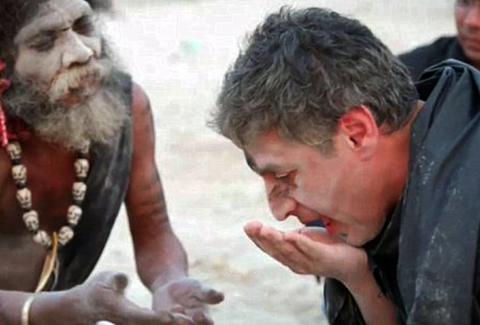By Jonathon Van Maren
The last time CNN’s Reza Aslan stirred up controversy, it was because he wrote a terribly-researched book on Jesus Christ. Now, hosting a series called Believer with Reza Aslan, focusing on religious beliefs from around the world, he’s back in the spotlight—this time for meeting with a tiny Hindu sect called the Aghori, where he drank alcohol from a human skull, had cremated human remains smeared on his face, and then actually ate part of a cooked human brain. The fact that he’d actually engaged in cannibalism seemed to escape him, as he promoted the segment on Facebook by asking, “Want to know what a dead guy’s brain tastes like? Charcoal.”
The backlash was immediate.
Rep. Tulsi Gabbard accused CNN of promoting “people’s misunderstanding and fear of Hinduism” rather than “working to increase mutual understanding and respect between people of different religions.” People magazine noted that Aslan was “accused of mocking Hinduism.” The Hindustan Times stated that it was shameful for CNN to air such a segment, considering “multiple reports of hate-fueled attacks against people against people of Indian origin across the US.” Another newspaper reported that Aslan was “under fire for misrepresenting Hinduism.” Over and over again, journalists and commentators and activists condemned Aslan for one thing: misrepresenting Hinduism and promoting stereotypes.
Leave aside for a moment the fact that the entire media consistently uses photos of the Westboro Baptist Church in any story referring to Christians even though the so-called “church” consists of a single family, and that they gleefully make use of tiny fringe sects to characterize the entire faith. Why is everyone missing the central point of this story—the fact that Reza Aslan ate a piece of a cooked human brain? Why is the outrage not over the fact that a CNN host practiced cannibalism?
The answer is pretty simple: Our post-modern, relativistic culture no longer possesses the moral framework to condemn things that were once representative of the depths of wickedness. Who says it’s wrong to eat a human brain? Why should we listen to people who say that eating human brains is wrong? Why should those who condemn cannibalism be permitted to legislate their morality? If human beings are simply animals, is there any moral case against cannibalism besides a rather feeble appeal to the potential negative impact on human health?
I’m sure many people actually are shocked by the fact that a CNN host drank alcohol out of a human skull and ate part of a dead human being’s brain. But the fact is, our post-modernism deprives us of the moral tools necessary to condemn such actions. Nothing is sacred, after all. Human beings are simply randomly evolved piles of protoplasm who eat, drink, die, and decay. In this framework, the only way we can condemn cannibalism is to fall back on the sole reservoir of moral outrage left in society: Identity politics and political correctness. From that perspective, maybe it was wrong for Aslan to choke down someone’s brains, and maybe it wasn’t—the important point is that he potentially misrepresented Hinduism. There is a whiff of Hinduphobia, bigotry, and maybe even racism—cue the rage and calls for resignation.
Our moral compass is so thoroughly smashed that we have a CNN commentator who practiced cannibalism, and he is only condemned for potentially misrepresenting a polytheistic religion.









where is cannibalism condemned ?
What is the foundation for your moral compass on this?
Funny that we live in a day and age where this is actually a question. http://biblereasons.com/cannibalism/